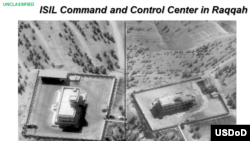With the U.S. beginning a military campaign against the Islamic State group, another band of Islamist militants has emerged as a direct threat to the security of the United States and Europe.
The Khorasan group is one of al-Qaida’s affiliates in Syria and possibly one of the most secretive organizations operating under the cover of Syria's civil war. Unlike many of the other groups in Syria that seek to overthrow President Bashar Assad, or the Islamic State, Khorasan has expressed little interest in the Syrian national conflict.
The group’s main goal: hitting the United States or its installations overseas with a terror attack.
The chief U.S. military spokesman at the Pentagon, Rear Admiral John Kirby, said Khorasan became a prime target of the airstrikes Tuesday inside Syria after intelligence operatives uncovered plans for an “imminent” terror attack against Western interests.
“We believe the individuals plotting and planning it were eliminated” in eight U.S. airstrikes overnight, Kirby said in an American television interview (ABC-TV's Good Morning America).
During a later news briefing, Pentagon officials said the airstrikes were "very successful," but that it was too early to confirm the full extent of the damage and casualties inflicted on the militants.
In contrast to the much larger Islamic State group, Khorasan members keep a low profile in social media. Their videos and Internet postings generally do not depict identifiable Westerners in their ranks, even though Khorasan is said to have attracted the second-largest contingent of foreign fighters in the Syrian civil war, after the Islamic State.
Khorasan's leader is Muhsin al-Fadhli, once believed to have had a very close relationship with Osama bin Laden. He is 33-years-old and was born in Kuwait. He spent much of his life in Iran, though, where he reportedly directed al-Qaida’s Iranian branch after the terror network's former leader in Iran, Yasin al-Suri, was detained.
Al-Suri eventually was released and returned to his position in charge of al-Qaida in Iran. Fadhli then was reassigned, reputedly to Syria, where he is believed to still reside.
Terrorism experts claim Khorasan is made up of al-Qaida members from across the Middle East, South Asia and Europe, with a majority coming from Afghanistan, Yemen and Syria. But the group also has been able to recruit Europeans and Americans who came to Syria to fight with other jihadist groups.
“Their focus seems to be on recruiting Western jihadis who are coming to Syria to fight, and equipping them with bomb-making techniques to be able to carry out terrorist attacks on the West,” said Craig Larkin of Kings College in London.
A chief concern is the group’s leading bomb designer in Yemen, Ibrahim al-Asiri, whom the U.S. has targeted with drones, so far without success.
Saudi-born al-Asiri has for years been high on America's most-wanted list, and is believed to have been involved in attempts to bring down trans-Atlantic flights.
Analysts said he used his skills as a chemist to devise ways to conceal explosives - the best known being the unsuccessful 2009 attempt to bring down a commercial flight from Europe to Detroit, carried out by an al-Qaida member who became known as "the underwear bomber."
The young man tried to detonate explosives he was carrying in his underwear, but only succeeded in burning himself severely and starting a fire that flight attendants easily extinguished. He is now in prison.
In another failed attack attributed to al-Asiri, British bomb disposal experts intercepted a shipment of printer ink cartridges that had been packed with plastic explosives. Some of the designs attributed to the bomb designer sound like the stuff of science fiction, such as having explosives implanted in the human body.
One of al-Asiri's most imaginative and ruthless attacks was a suicide plot in Saudi Arabia in 2009.
The master explosives-maker used his willing younger brother, Abdullah, for this attack, an assassination attempt against a Saudi prince. Abdullah was carrying a bomb on his body - reputedly hidden in his rectum - that was detonated when the target drew near. The explosives detonated as planned, but Abdullah was the only fatality.




